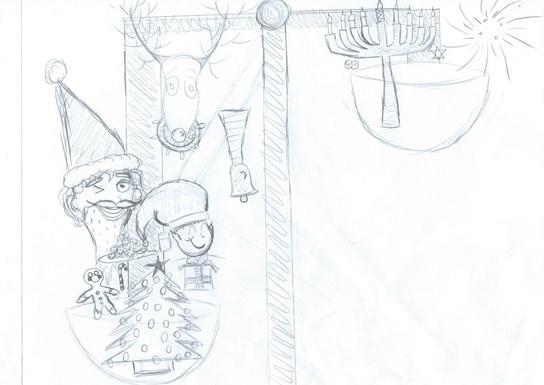 By Kiara Alvarez Reporter Most students and faculty here at Council Rock North will admit that they are excited for Winter Break. This year, Winter Break begins on December 24th (Christmas Eve), and students return to school on January 4th. For some, the break provides a time to relax and be free of stress, but others are reunited with distant family and are able to celebrate whatever holidays they may practice. Over the break, only two national holidays are celebrated: Christmas and New Year’s Day. Considering that practicing the Christian calendar is a national procedure, it is no surprise that we have these two holidays off. However, not all members of our school celebrate Christian holidays like Christmas. The other two common winter holidays in our school are Hanukkah and Diwali. Most people know the history behind Christmas, but a small number of people know the history behind Hanukkah, and even fewer are aware of the history behind Diwali or its existence in general. In short, Christmas is a Christian celebration of Jesus’s birthday, Hanukkah (the festival of lights) is a Jewish holiday commemorating the time when a wax candle was supposed to last one night but instead lasted eight (thus there being eight nights), and Diwali (also known as the festival of lights) is a Hindu commemoration of India’s new year. Although Diwali occurs typically sometime in October or November, it is still celebrated at roughly the same time that others are beginning their Christmas preparations. Despite the observance of Hanukkah by many, Shira Palmer, a Jewish freshman here at Council Rock North who is quite religious and even keeps Kosher, believes that Christmas is much more important to the Christian community than Hanukkah is to the Jewish one and thus deserves a day off school. “We get Rosh Hashanah and Yom Kippur off [, and] they are high holidays,” she began. “Hanukkah is eight days [and not as] significant. I don’t even go to services for [Hanukkah because it’s] not an all-day [event and I’ve] realized it’s not the same type of holiday as Christmas. [Also,] it [would be] too much [time off] if we accounted for every single holiday. [However,] I think everyone should have a minimal understanding [of every holiday].” However, Sneha Sing, a Hindu senior here at North who celebrates both Christmas and Diwali, believes that Diwali is worthy of a day off school, as well. “Diwali is just one day [and] we get so many other days off [that] one day won’t hold us back,” she argued. “I know a lot of students here [at North] that celebrate Diwali [and] it is a very religious holiday. [It] takes up a lot of time [because] I need time to pray to God.” Her peer Darshana Paramesh, who also celebrates Diwali, agreed with her point entirely. She added that, “All religions are equally important,” when explaining her reasoning for why Diwali should be given a day off. After being given a brief description of what Diwali is, Mrs. Susan McCarthy, Council Rock North’s principal, voiced her opinion on the matter of Diwali too. “I would agree that there is an overall rationale [and] we are respectful of people’s beliefs, so we need to reevaluate periodically if it [is] important to the community,” she noted. In our school (and nationally too), Christmas has been established as the most celebrated winter holiday, and part of Christmas’s popularity may be due to its iconic mascot, jolly old Saint Nicholas, or its catchy tunes. In fact, there are many people who are not even Christian who celebrate it, but why? One example is Sneha Sing, who explained why a Hindu might choose to celebrate the wintry festivity. “Most Americans celebrate it [, and it has] a happy atmosphere,” she clarified. Shira Palmer again had a similar viewpoint and chose to elaborate more on the aspect of a child’s benefit. She pointed out that “[Christmas is] more child friendly, and it’s great for the kids,” when referring to Santa Claus. However, North freshman and Christmas celebrant Gonzalo Appiani believes the advertisements have become overbearing. “I see Christmas commercials every day,” he stated, “and [the media has] sucked the joy out of Christmas!” With a similar opinion, Mrs. McCarthy spoke about Christmas and the public. “Social media promotes it,” she stated. “[It’s an] all-inclusive phenomenon [with] shopping and stores that becomes a never ending cycle year after year.” As a member of the Jewish community, Shira Palmer shared her opinion on its advertising. “As soon as Halloween ends, it’s Christmas this, Christmas that! It’s so annoying,” she exclaimed. “I think of winter and associate it with Christmas trees, even though I don’t even have one.” Although they all came from different families and traditions, these students all shared one idea, and that was that Christmas is the most publicized holiday. Holidays are definitely not equal, even in one’s own religion since some holidays are more significant than others, but perhaps we should reevaluate which holidays should provide days off school to ensure more equality.
0 Comments
Your comment will be posted after it is approved.
Leave a Reply. |
Archives
February 2022
Categories |
 RSS Feed
RSS Feed
